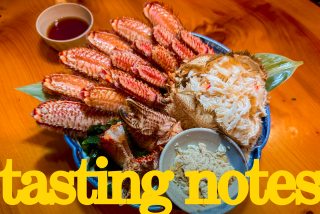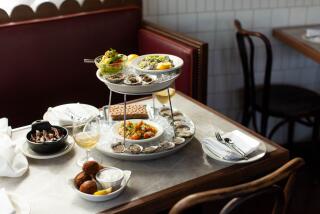Rogues, nomads, dissident chefs
THE room is abuzz with 30 chattering diners who sip bring-your-own wine and dip plantain chips into creamy layers of pureed sweet potato, Peruvian Aji peppers and Dungeness crab. Between courses, local blues singer-songwriter J.L. Stiles strums a guitar and sings about love, life -- and food.
To the uninitiated, the people sitting on floor cushions discussing peach salsa and almond-crusted saffron cheesecake might look like a gathering of food-loving friends, but in fact, most are strangers.
They’ve been brought together by Ghetto Gourmet, one of several underground supper clubs at the forefront of a rapidly growing “anti-restaurant” movement. Based in San Francisco, Ghetto Gourmet has branched out in recent months, staging dinners in June and October in Los Angeles, with others planned for next week in New York.
It’s a movement that started in Northern California and Oregon but is spreading nationwide as impresarios behind intriguingly named entities such as the Hidden Kitchen, Supper Underground and Vagabond have become active (in Sacramento; Austin, Texas; and Seattle, respectively).
The roots of several of these alternative or nomadic dinner events can be traced to would-be chefs and restaurateurs with more ambition than start-up money, but the concept takes many forms.
Some, such as L.A.’s Secret Restaurant art-and-food evenings, are by invitation only; others take online reservations. There may, or may not, be a professional chef in the kitchen. Meals are served in homes, on farms, in parking lots or just about anywhere a restaurant is not. And there are San Francisco values in play.
One new Bay Area supper club, SubCultureDining, calls itself a “pirate faction” and posts a “creed of ethics” endorsing “commitment to good food, community, sustainability for all.”
“The point of an underground restaurant isn’t just to gather people together to eat in an alternative setting,” says Ghetto Gourmet’s founder, Jeremy Townsend, 30. “It’s to change the way we experience food -- truly without walls and without the boundaries.”
At the recent Ghetto Gourmet dinner, Townsend bounds up and down the narrow attic staircase, balancing half a dozen plates on each trip. A volunteer crew of friends plates dishes in the bare-bones kitchen of a subdivided Victorian shared by five twentysomething roommates.
This evening’s cook, Efrain Cuevas, once worked in a restaurant in Chicago but is now a mechanical engineer. Townsend at times uses enthusiastic amateurs in the kitchen but has also hosted dinners prepared by such professionals as Peter Jackson, executive chef at Piatti Locali in Santa Clara, Calif., and Serge Santiago, former executive chef at Mecca in San Francisco.
The Ghetto Gourmet got its start in 2004 when Townsend began posting on Craigslist (under “Miscellaneous Romance”) the weekly dinners he and his brother Joe, who cooked under Santiago at Mecca, put together at their Oakland apartment. The ad read, “Two brothers, a poet and a chef ... are hosting an underground restaurant in a dark corner of Oakland.... In an effort to make the world a groovy place, we’re inviting you to dinner. RSVP required.”
This kind of invitation strikes a chord with young people who make social connections online. At underground supper clubs, the chat room and restaurant have merged.
A way to meet locals
JONATHAN MAYER, a Google employee, heard about Ghetto Gourmet when, new in town, he placed his own Craigslist ad requesting, half-jokingly, tips for meeting locals. A sincere Ghetto Gourmet enthusiast suggested he check out a dinner. “I wound up at this random dinner, eating in someone’s house I don’t even know, which was hard for me to adjust to at first,” Mayer says. “But I keep coming back for the same reason as my first visit -- to meet new, interesting people.”
Online chat rooms, blogs, photo blogs and urban communities such as Craigslist have enabled the underground restaurant scene to flourish. But Craig Newmark, founder of Craigslist, began attending another San Francisco simply because he’s a friend of the organizer, James Stolich.
Stolich, a former Internet executive and enthusiastic cook who “interned” at San Francisco’s Quince with owner and executive chef Michael Tusk, launched his small supper club out of his home last spring. “James’ food is certainly part of what keeps me going back,” Newmark says. “But it’s really about the social aspect -- you just can’t re-create that in a restaurant.”
For people outside the inner circle, getting invited to one of the smaller events can be difficult. Websites seldom list a direct phone number.
“I’m most concerned about creating an interesting dinner party with the right people, so I use e-mail as a filter,” Stolich says. “With only 14 guests, it’s important to make sure everyone is sincere and really wants to be there or the mood is ruined.”
Small roving dinners, such as Paladar Temescal in Oakland, reveal the dinner’s location only to those who firmly RSVP by e-mail.
Says Hannah Calvert, founder of Supper Underground, a new roving supper club in Austin. “I love to cook, and I love to meet people. But I have a full-time job and I can’t have people calling me constantly.”
Some dining event organizers don’t want the public to call or e-mail -- ever. That’s the case with Secret Restaurant, an occasional Los Angeles art happening and food event hosted by Miguel Nelson, 38, and Sherry Walsh, 33, in their loft near Chinatown. Nelson and Walsh host 50 to 400 people at each event, charging a $25 to $125 fee that they say just covers costs. Invitations are posted on Nelson’s website, but interested individuals must send an e-mail stating how they know the hosts. No undocumented guests are allowed.
“This is our home and creative space, not a restaurant,” Nelson says. “If we’re planning a specific event around an artist or musician, we’ll ask them to invite their friends, so in that sense we have a constantly revolving guest list. But, really, it’s all people we know somehow, and we want to keep it that way.”
Nelson is adamant that food is not the focus of Marvimon events, but he seeks out some of Los Angeles’ best-known chefs. Guest chefs at his art happenings in the last year have included Nancy Silverton and Suzanne Tracht.
Underground anti-restaurants that are open to the public tend to either rely on suggested donations (as opposed to set fees) or to frequently change locations to avoid running afoul of county health departments. Repeatedly charging for dinner in a private home or other regular site could be considered operating an illegal restaurant, particularly if the host’s motive is not entirely social.
“If food is sold with regularity, the dinner club must have a private, social function to operate within regulations,” says Terrance Powell, director of food inspection for L.A. County’s office of environmental health. “Once it attempts to become a viable food business, it is now a restaurant operating without a license. Still, it’s not black and white with dinner clubs, so each is looked at on a case-by-case basis.”
The nomadic restaurant that covers the largest territory is Outstanding in the Field, founded in 1999 by Jim Denevan, former executive chef of Gabriella Cafe in Santa Cruz. Denevan hosted farmer dinners at Gabriella Cafe, building meals around a single producer’s products.
Then he went a step further, loading a bus with a portable kitchen, cookware, tables and chairs and taking the restaurant directly to the farm.
Six years later, Denevan is still touring the U.S. in his bus-turned-mobile kitchen, inviting farmers, chefs, winemakers and food artisans to participate in dinners for 80 to 100 paying guests on a farm, ranch or winery.
The ‘Dissident Chef’
RUSSELL JACKSON, formerly chef at his now-closed namesake restaurant Russell’s, recently opened SubCultureDining, or SCD, in San Francisco. On his website, Jackson is referred to only as “the Dissident Chef,” and a skull with fork and knife crossbones is his pirate-themed logo.
SCD calls itself a private supper club but is set up more like a restaurant than other clubs. E-mail requests from outsiders are accepted for the six-course ($80) and nine- to 11-course $(120) prix fixe wine dinners held every Friday, Saturday and Sunday.
SCD dinners are a showcase for Jackson’s skills, a part of his plan to drum up investor interest in another restaurant.
“I just want to cook creatively, to push the boundaries, and until I get my own restaurant going, the SCD serves that purpose,” Jackson says.
At least one underground supper club has led to the opening of a restaurant. In 2001, Michael Hebberoy and wife Naomi, both in their mid-20s at the time, became the buzz of Portland, Ore.’s dining scene when they hosted a rogue supper club, Family Supper, from their apartment. In 2002, the Hebberoys opened a fully licensed restaurant in Portland also called Family Supper, which was successful but closed last April after the Hebberoys divorced.
Two weeks ago, Michael Hebberoy reemerged, this time in Seattle, with Vagabond, an above-ground hybrid. Vagabond meets in a local wine shop each week with featured guest chefs and a style -- communal tables, experimental food, groups of strangers and a nonrestaurant address -- drawn from its founder’s earlier enterprise.
Townsend, who is eager to turn the Ghetto Gourmet into a viable business, plans to create an online directory of worldwide alternative dining options through a separate website called Curious Fork. He will return to Los Angeles soon, possibly in December or early next year.
And next week he flies to New York City to host his first East Coast Ghetto Gourmet events. The location is not yet set for one of the dinners, but he isn’t worried. Someone (a stranger) will donate his or her apartment or loft as the dinner site in the nick of time.
One thing is for sure: No matter what form it takes, an underground supper club isn’t exactly underground anymore.
More to Read
Eat your way across L.A.
Get our weekly Tasting Notes newsletter for reviews, news and more.
You may occasionally receive promotional content from the Los Angeles Times.






